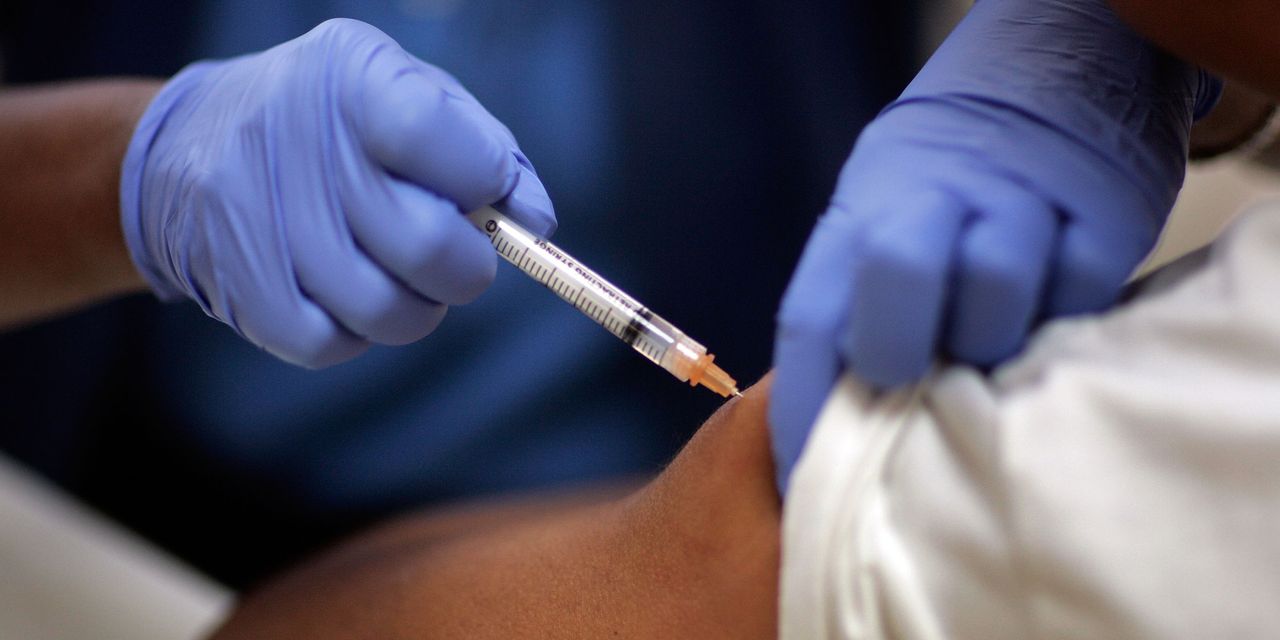Late last year, when a surge of respiratory syncytial virus infections hospitalized roughly 500 out of every 100,000 U.S. children under the age of 4, there was little to be done to blunt the disease’s impact.
No vaccines existed to protect vulnerable older adults or young children from RSV, a common respiratory infection that kills 10,000 seniors and 300 children in the U.S. each year.
That is about to change. For the first time, the U.S. is on the brink of rolling out a number of RSV shots. The latest development came late Thursday, when a Food and Drug Administration advisory committee voted unanimously in support of the risk benefit profile of nirsevimab, a
Sanofi
(ticker: SNY) and
AstraZeneca
(AZN) monoclonal antibody that prevents RSV in newborns.
That jab is only one of a number of RSV immunizations likely to enter the U.S. market in the coming months, alongside vaccines from
Pfizer
(PFE),
GSK
(
GSK
), and
Moderna
(MRNA).
The companies will be competing for shares of what analysts at Jefferies estimate will be a $15 billion a year global market, roughly $8 billion of which will be in the U.S.
Here is a rundown of the RSV prophylactics likely to be available in the U.S. soon, and how analysts handicap their prospects.
Arexvy
GSK’s Arexvy received the first FDA approval for an older adult RSV vaccine in early May. The shot is approved for adults aged 60 and up. In a Phase 3 trial, it showed 71.7% efficacy against cases that met GSK’s least severe case definition; 82.6% effective against cases that met its more severe case definition; and 94.1% effective against cases that met its most severe case definition.
The next step for Arexvy is a meeting of the CDC’s influential Advisory Committee on Immunization Practices, which makes recommendations for vaccine usage in the U.S. The committee is set to discuss and vote on the vaccine on June 21. GSK says it plans to roll the vaccine out this year.
In his May 31 note, Jefferies analyst Michael Yee wrote that he expects GSK and
Moderna
to split the older adult market for RSV vaccines, with
Pfizer
holding third place.
Abrysvo
The FDA has also approved Pfizer’s Abrysvo for adults aged 60 and up, in a decision issued May 30. Abrysvo didn’t perform quite as well as Arexvy in its Phase 3 study: The Pfizer vaccine was 66.7% effective against the cases that fit the study’s less severe case definition, and 85.7% effective against cases that fit the more severe definition.
Despite its inferior efficacy results, Yee wrote that he expects Pfizer to eventually hold 20% of the U.S. older adult RSV vaccine market, due to “its industry-leading infrastructure and sales base in Immunology and Vaccines space.”
Like GSK, Pfizer is waiting on a recommendation from the CDC’s vaccines advisors. The CDC committee will consider and vote on a recommendation for Abrysvo at the same June 21 meeting that it will consider GSK’s Arexvy.
mRNA-1345
Moderna has said that it plans to apply for FDA approval of its older adult RSV vaccine, mRNA-1345, before the end of June. In a large trial, the vaccine was 83.7% effective at preventing less severe disease in adults aged 60 and above, and 82.4% effective at preventing more severe disease.
If all goes well, the Moderna vaccine could launch next year. Yee expects it to eventually share the largest slice of the U.S. market with GSK.
PF-06928316
Pfizer is also waiting on FDA approval of an RSV vaccine that would be given to expectant mothers to protect their newborns through the first six months of their lives.
An FDA advisory committee voted overwhelmingly on May 18 in support of the propositions that the vaccine was safe and effective. A Phase 3 study found that the vaccine was 81.8% effective against severe illness due to RSV in infants in the first 90 days of life, and 69.4% through the first six months.
A final decision from the FDA is expected in August. Yee, in his May 31 note, wrote that he sees the vaccine as a $300 million annual revenue opportunity for Pfizer.
Nirsevimab
Unlike the other RSV prophylaxis under development, nirsevimab, which will be sold under the name Beyfortus, isn’t a vaccine, but a monoclonal antibody. It is administered to newborns and to infants as a single dose, and intended to protect them through their first RSV season.
In a Phase 3 trial, the drug was found to reduce the rate of medically-attended lower respiratory tract infections caused by RSV by 74.5% after 151 days, which the companies say is the length of a typical RSV season.
The FDA’s favorable advisory committee vote on Thursday bodes well for the agency’s final decision, which is pending.
Sanofi
said Thursday that it is committed to delivering the drug in time for this RSV season, though the CDC’s advisors will also need to weigh in.
Yee sees a $1.5 billion market opportunity in the U.S. for newborn RSV immunization, and expects nirsevimab to dominate the market. While
AstraZeneca
led development of nirsevimab, Sanofi will be in charge of commercialization.
The rest of the field
While
Johnson & Johnson
(JNJ) recently dropped its RSV vaccine program, other companies are still hurrying to join the crowded field, including
Bavarian Nordic
(BVNRY), which is running a Phase 3 trial. It will have its work cut out for it making a dent in a field already crowded with major players.
Write to Josh Nathan-Kazis at [email protected]
Read the full article here


